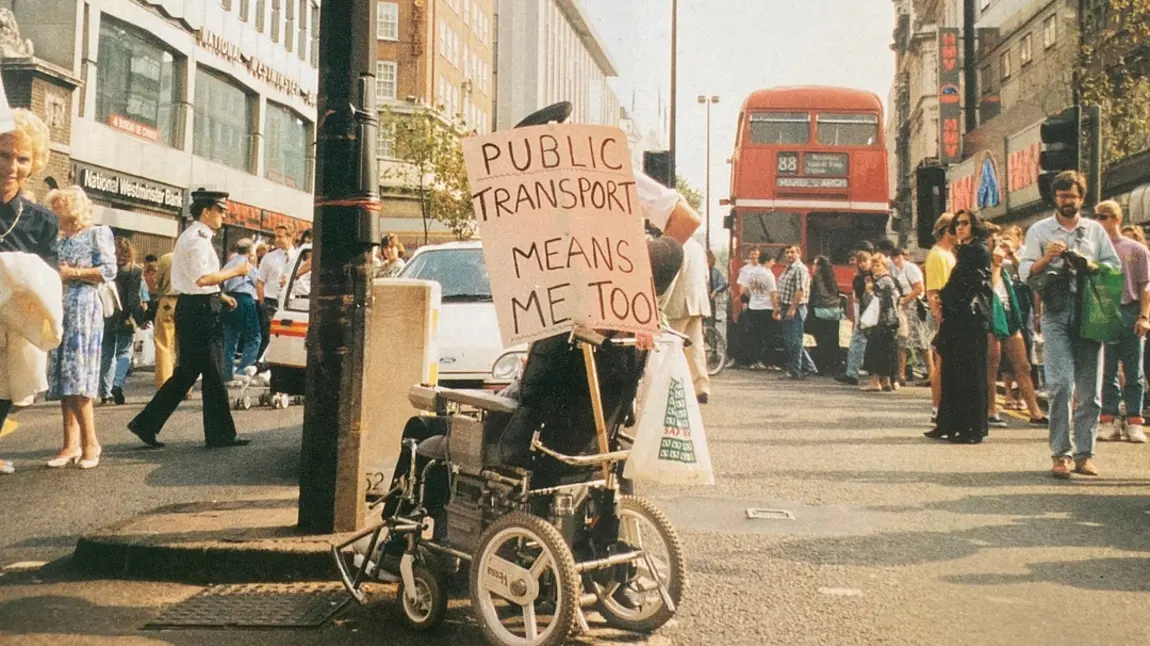Creating an archive for historic disability rights movement

The disability rights movement was integral to achieving the Disability Discrimination Act in 1995, which transformed the rights and changed the lives of disabled people.
Many people with a disability played a part in this historic achievement, but their stories are at risk of being lost forever if they aren’t documented and archived.
Creating a legacy and archive
Through the National Disability Movement Archive and Collection project, Shape Arts will record and digitise important social history and heritage stories during the four-year programme. Thanks to an £840,000 National Lottery grant, an accessible and interactive website will:
- digitise and preserve collections of key figures from the movement
- build an e-learning portal with a full suite of accessible assets including games, magazines and graphic novels for younger audiences
- catalogue and create an extensive collection of oral history films
The disability rights movement was integral to change and documenting this in the most inclusive manner will make sure that these currently hidden histories are there forever.
Stuart McLeod, Director of England, London & South at The National Lottery Heritage Fund
Alongside the website, a walk-in learning zone will be created at Peckham Library. In 2025, a Routemaster ‘Off the bus tour’ will visit locations throughout the UK, including rural areas, to tell the stories through a mobile cinema.
Stuart McLeod, Director of England, London & South at the Heritage Fund, said: “The disability rights movement was integral to change and by documenting this in the most inclusive manner will make sure that these currently hidden histories are there forever. This will help us all to learn more about each other and our differing personal lives, experiences and memories."
Memories shared for the first time
Some of the collections and personal accounts to be preserved will be available to access for the first time and include some key figures from the historic movement:
- The Keith Armstrong collection – Armstrong’s personal campaigns ranged from fighting for accessible transport to begging in the streets for income to cover his personal assistance costs. A collection of Armstrong’s activist materials was created following his death in 2019.
- The Agnes Fletcher and Adam Thomas collection – The couple met on rights demonstrations and have a wealth of memorabilia including huge, handmade protest banners.
- The Penny Pepper diaries – Pepper was a long-time rights activist and kept diaries of her day-to-day fights for access and inclusion from the 1980s to the present.
- The Allan Sutherland collection – Sutherland was a leading activist from the early 1980s and was lead media officer on the Block Telethon demonstrations.
- The Le Court Film Unit – A collection of 1960s films from the beginning of the modern rights movement.
- The Blast TV oral history interviews – Accounts from key players in the movement from the 1970s onwards, including Baroness Jane Campbell, Alia Hassan, John Evans and Micheline Mason.
Exploring disability arts and heritage
This project will build on the success of the established National Disability Arts Collection & Archive (NDACA) which was created by Shape Arts in 2018 with support from the Heritage Fund.
Since NDACA was created, more than 8 million people have engaged with the website to learn about the heritage story of the UK disability arts movement.
This project will continue to explore disability heritage, bringing to life the unique perspectives and experiences of disabled people during the movement for disability rights in the UK.
Baroness Jane Campbell, patron and an active voice in this civil rights movement, said: “The project will celebrate transforming society's response to disabled people from medical cure or segregated services to one of a civil right to be fully included in society as equal citizens.”
Find out more
At the Heritage Fund, we believe everyone should be able to benefit from our funding. Discover more about our commitment to investing in disability heritage.


